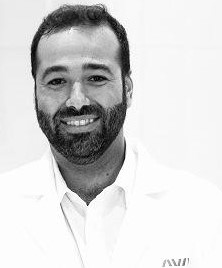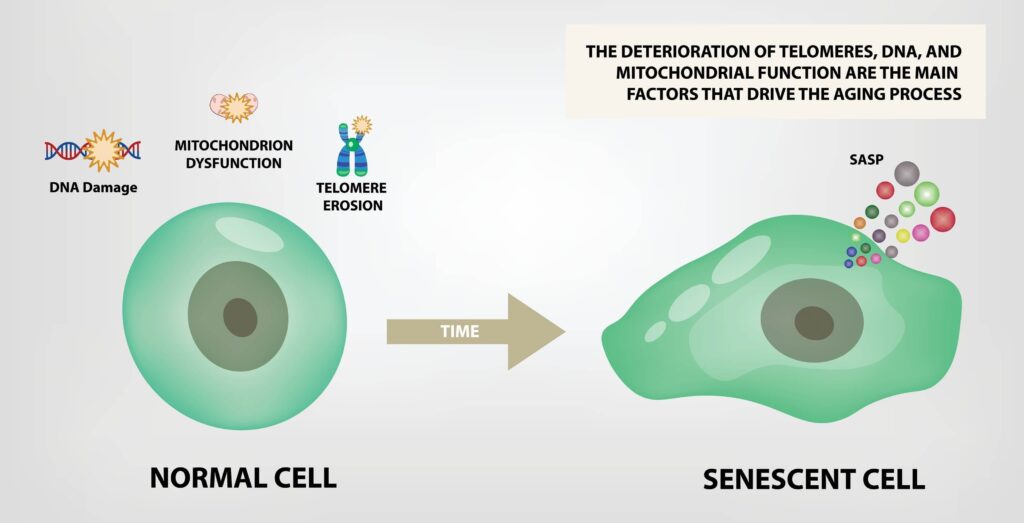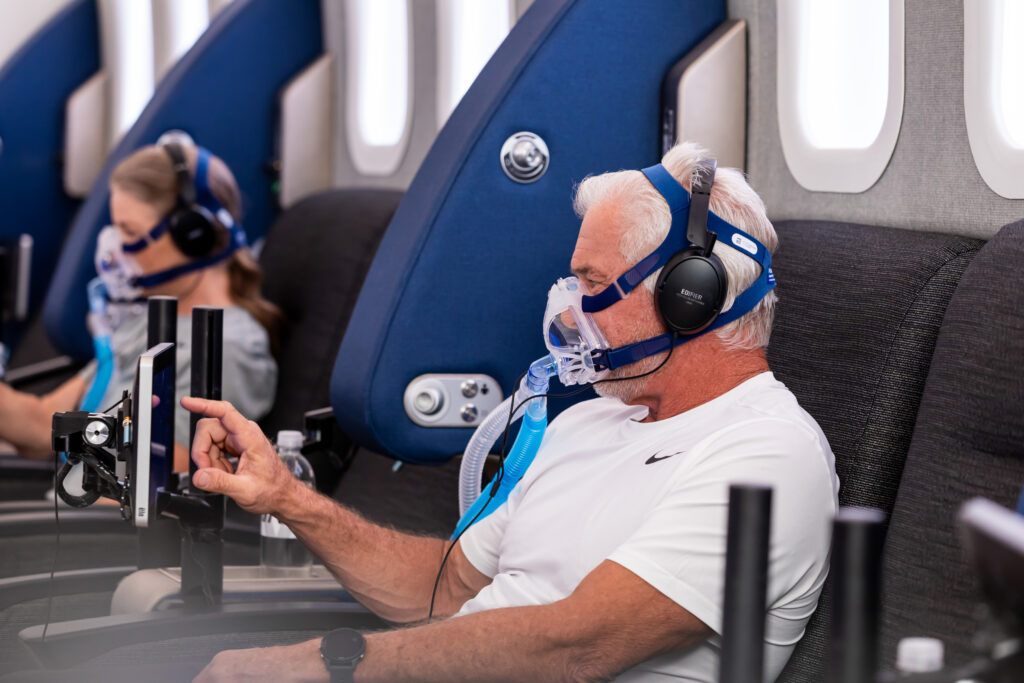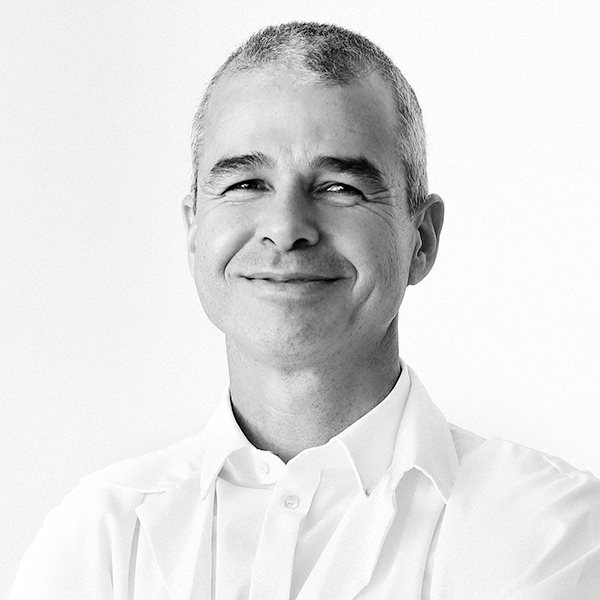
The Science of Aging: Understanding Senescent Cells


Aging is a natural part of life, but it doesn’t necessarily mean a decline in health and well-being. It can — and should — represent an exciting new phase of discovery, growth, and fulfillment.
Recent scientific advancements have unveiled a unique protocol for managing senescent cells as we age, offering hope for new ways to combat age-related diseases and improve our quality of life.
What Are Senescent Cells?
Senescent cells, also called zombie cells, are cells that have stopped dividing but do not die. Over time, these cells build up in the body, triggering the signs and symptoms of aging.

How Do Senescent Cells Impact Aging?
Not all senescent cells are bad. In fact, there are times when the molecules and compounds in these cells play vital roles across our lifespan (e.g., embryonic development, childbirth, and wound healing). However, as we age our immune system grows less efficient. This shift encourages senescent cells to accumulate, tainting healthy cells.
As a result, senescent cells can produce a detrimental effect on our health and the way we age. They release inflammatory molecules that damage tissues and contribute to a variety of age-related diseases.
This process can be compared to a moldy piece of fruit that decays the entire bowl. A small group of senescent cells can spread inflammation, damaging neighboring cells and rendering us more vulnerable.
The Role of Senescent Cells in Chronic Diseases: What Research Says
Let’s take a moment to dive deeper into the conditions mentioned above. As we age, the accumulation of senescent cells in our body increases, making us more susceptible to stress, illness, slower recovery from injuries, and challenges in learning new things.
Cell senescence has been linked to conditions that grow more prevalent with age, such as:
- Alzheimer’s disease
- Diabetes
- Cardiovascular disease
- Cancer
- Arthritis
- Stroke
- Dementia
- Osteoarthritis
Research has discovered:
- Senescent cells contribute to tumor growth. Studies note that “senescent cells produce a variety of secreted proteins…[which] plays pivotal but varying roles in the tumour microenvironment.” The group of proteins that senescent cells produce “promote or suppress tumorigenesis.” Tumorigenesis is the process in which normal cells develop into malignant or cancerous cells.
- Some organs or tissues collect senescent cells at a faster rate than others. This higher rate can lead to conditions such as “CVD [cardiovascular diseases], cancer and neurodegenerative diseases.”
- Senescence, or the state in which a cell stops progressing through the normal cell division stages, “increases inflammation and contributes to the development of chronic disease in the aging human body.”
- Lifestyle interventions “including exercise, nutrition, intermittent fasting, and consumption of phytochemicals, prebiotics and probiotics, and adequate sleep” can help minimize the effects of cellular senescence.
Targeting Senescent Cells With the World’s Most Advanced HBOT Protocol

Exciting new therapies are being developed to target and eliminate senescent cells, potentially reversing some of the effects of aging. One approach is the Aviv Medical Program, a program offered only at Aviv Clinics that may include a unique hyperbaric oxygen therapy (HBOT) protocol.
Aviv Clinics offers the world’s most advanced delivery of hyperbaric oxygen therapy, backed by nearly two decades of dedicated research by scientific teams. Our HBOT protocol goes beyond traditional hyperbaric oxygen treatments by using advanced techniques to optimize your body’s response to oxygen.
Learn about the science behind HBOT.
Hyperbaric Oxygen Therapy (HBOT) and Senescent Cells
The HBOT program offered as part of the Aviv Medical Program has demonstrated promising results in reducing the presence of senescent cells and reversing aspects of biological aging.
Reduction in Senescent Cells
A study published in Aging found that:
- Repeated HBOT sessions using this specific protocol led to a “clearance of senescent cells in the aging populations.”
- The HBOT protocol helps increase the length of telomeres, the DNA-protein structures that help manage a cell’s lifespan.
Improvement in Cognitive Function
Another research study illustrates this specific HBOT protocol’s positive impact on cognitive function in healthy aging adults. Scientists found that HBOT induces “cognitive enhancements in healthy aging adults via mechanisms involving regional changes in CBF [cerebral blood flow].”
The positive findings offer hope for those seeking to maintain their cognitive health as they age. HBOT could be a valuable tool for preserving mental sharpness, which is one of the keys to helping people live life to the fullest.
Boost in Physical Performance
A clinical trial with adults over 64 years of age illustrates the potential impact the same HBOT protocol can have on “improving physical performance in aging adults.” Participants experienced improvements in VO2Max (a measure of aerobic fitness) and VO2VT1 (lactate threshold).
Explore the anti-aging effects of hyperbaric oxygen therapy further.
The Future of Senescent Cell Research: How Aviv Clinics Is Leading the Way in Reverse Aging

The field of senescent cell research is rapidly evolving. As scientists continue to unravel the complexities of senescent cells, we can anticipate more groundbreaking advancements.
Aviv Clinics is at the forefront of this exciting field. Our researchers are exploring the potential of targeting senescent cells to improve healthspan and longevity. Through the innovative therapies in the Aviv Medical Program, we are working to develop effective strategies to reduce the accumulation of senescent cells and mitigate their harmful effects.
Future advancements in senescent cell research could lead to:
- New anti-aging therapies: The development of additional interventions that specifically target and eliminate senescent cells
- Increased lifespan and healthspan: Ultimately, the goal of senescent cell research is to extend not just the lifespan but also the number of years we live in good health.
- Improved health outcomes: By reducing the burden of senescent cells, we may prevent or delay the onset of age-related diseases, such as Alzheimer’s, diabetes, and cardiovascular disease.
Read the current research on cognitive performance and aging.
The True Manifestations of Our Research: Bob & Laurie Illustrate It’s Never Too Late
Laurie was concerned about her health due to a family history of Alzheimer’s and dementia. She had been noticing some symptoms of cognitive decline and pursued the Aviv Medical Program alongside her husband, Bob.
Laurie and Bob appreciated the staff’s personable approach and walked away with physical and mental improvements, from skin, hair, and athletic improvements to mental tenacity. Bob calls the results he and his wife achieved through the program “… beyond what my expectations would have been.”
Elevate Your Quality of Life with Aviv Clinics
Senescent cells play a significant role in the aging process. By understanding their impact on health and well-being, we become closer to developing more effective strategies to combat age-related diseases and improve our quality of life. With continued advancements in this field, we can hope for new and innovative treatments that will help us live healthier and more fulfilling lives.
At Aviv Clinics, we are dedicated to elevating clients’ journeys. Our goal is to help our clients optimize their health and well-being through cutting-edge treatments and personalized care.
Learn more about how Aviv Clinics can help you reverse the biology of aging.




